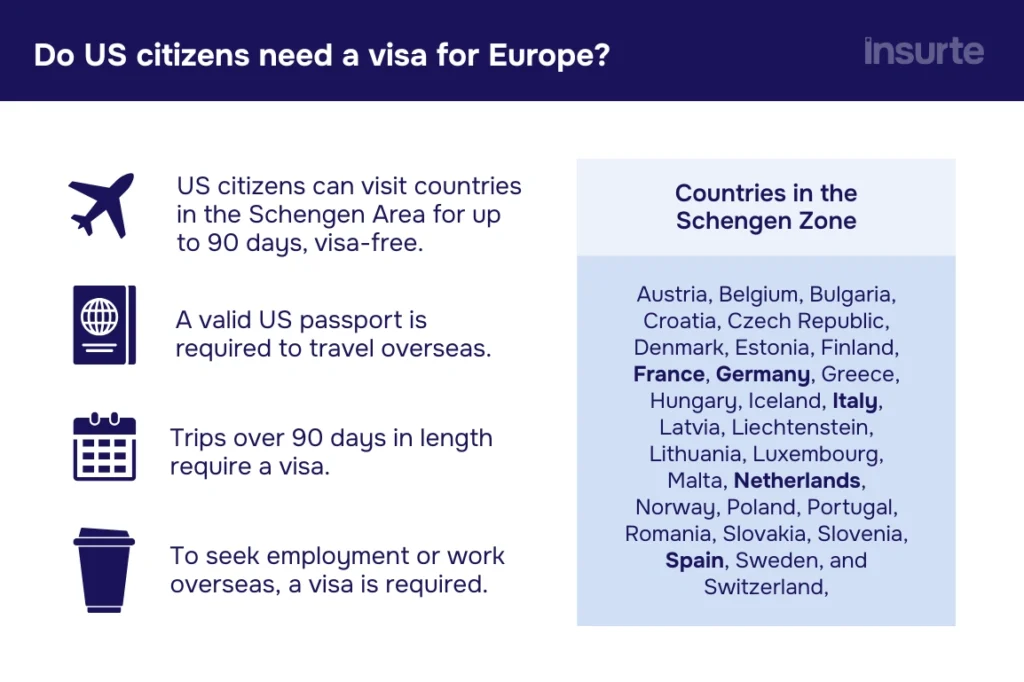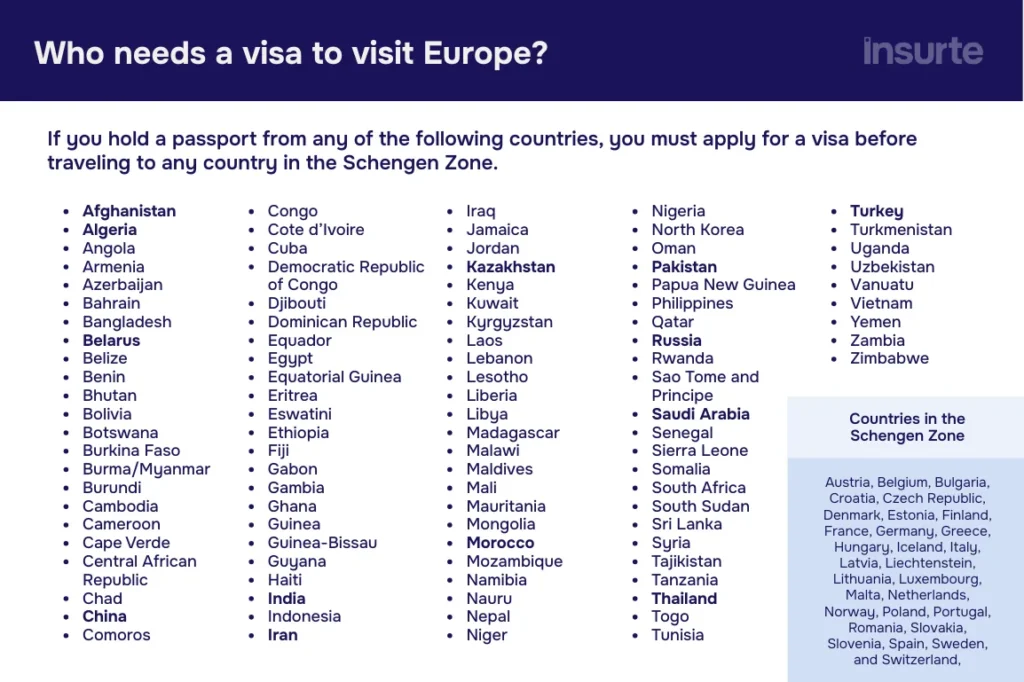Home > Everything You Need to Know About Applying for a French Visa

Everything You Need to Know About Applying for a French Visa
If you're planning a trip to France, there are several things you need to do. Whether you're going to be strolling through the streets of Paris on vacation or visiting to study, work, or do something else, understanding the visa process is important.
Not everyone who travels to France needs a visa. In fact, it depends on a few different factors that we are going to dive into in this guide.
This overview of France visas (which is a Schengen visa; we will talk about that too) will help you:
- Understand whether or not you need a visa
- Help you easily navigate the process
Allez-y !
Who needs a visa for France?
Millions of people travel to France every single year. In most cases, these travelers need a visa. Whether or not you need one, though, depends on your country of nationality and purpose or length of stay.
If you’re from India, China, or another country without a visa-waiver agreement with the Schengen area, you need a visa to enter France.
On the other hand, if you’re from a country that has a visa waiver agreement, you do not need a visa to visit France as long as your trip is for leisure/tourism and does not exceed 90 days in length (except in specific cases).

Do US citizens need a visa for France?
Typically, no. US citizens do not need a visa for short stays in France – up to 90 days within a 180-day period – for tourism, business, or family visits. If your stay exceeds this, or if you plan to work or study, you’ll need a visa for France.
Who else doesn’t need a visa to visit France?
In addition to the US, other countries with visa-waiver agreements, such as Canada, Australia, and the UK, can enjoy trips to France, but the same rule applies. They can only stay in France without a visa for up to 90 days within a 180 day period.
Citizens of the EU, EEA, and Schengen zone countries do not require a visa for France.
How long can you stay in France without a visa?
If you're a traveler who does not require a visa to visit France (US citizens, for example), you can stay in the Schengen area for 90 days maximum at a time (in a 180-day period).
This means that once you've hit the 90-day maximum, you must leave the Schengen area, regardless of how long you have been in France specifically.
For instance, if you spent 30 days in Spain, then 30 days in Italy, then 30 days in Portugal (all back to back), you must leave the Schengen area because you have hit the 90-day limit, even if 0 days were spent in France.

How to apply for your visa
The visa application process for France depends on the length and purpose of your visit, but begins online through an official site called France-visas.
Once you’ve identified the specific visa you need (in most cases, it's a Type C Schengen visa), you can gather the required documents and submit your application to a French embassy, mainly through the help of a visa processor (such as TLScontact).
You can't apply online
Though the process does begin online. You’ll need to start the process through the online site France-visas. For some visas, you may be able to submit some of your documents through this platform as well.
With that being said, every applicant will still need to schedule and attend an in-person appointment.
In the coming years, travelers will be able to apply for a France visa online through a robust new European platform called EU VAP. Even so, part of the process will still require an in-person appointment.
How difficult is it?
The process, while it may seem complex, has a fairly straightforward application. It’s recommended that travelers begin the visa application process months before their intended trip date, as processing times can vary greatly.
France visa rejection rates
In 2024, 15.8% of French visa applications were denied. In general, visa applications are more likely to be rejected if they are incomplete or lack proof of financial stability.
Additionally, rejection rates can also change depending on the specific type of visa you’re applying for, and more.
It is important to understand that rejection rates like this are global. This means that 15.8% of French visas were denied worldwide.
A lesser-known fact is that different countries often have different rejection rates, meaning applications from one country may have lower acceptance rates than those from another country.
This is why it's important to take this metric with a grain of salt, as it doesn't accurately reflect each country.
Processing times
Schengen visas for France are typically processed within 15 days, but the process can take significantly longer, so always plan accordingly. Long stay visas may take longer.

France visa application requirements
The documents you will need to present depend on the type of visa you’re applying for. Whether you're visiting for vacation, business, or studies, ensuring you have all the necessary paperwork in advance will help you during the process.
If you don’t have all of the required documents, your application will likely be denied.
So, which ones are required? In general, there are some basic documents that nearly all French visa applications require.
Here are the typical documents you’ll need to apply for a visa for France:
- A completed visa application form.
- A recent passport-sized photograph.
- A valid passport (with at least 3 months of validity beyond your intended departure from the Schengen zone).
- Proof of Schengen travel insurance.
100% Schengen Compliant Travel Insurance
Get your proof of insurance now, guaranteed compliant ?
- Proof of accommodation (such as an invitation from a resident or a hotel reservation).
- Evidence of financial means to support your stay.
- A Schengen flight itinerary (proof of an ongoing flight).
What are the specific visa requirements?
France visa requirements, short stay
If you require a visa for short stays in France (under 90 days), you’ll need to supply the standard documents listed above, like insurance meeting Schengen visa insurance requirements. In addition to those, you may need to submit additional documentation depending on the purpose of your trip (to study, work, etc.).
France business travel requirements (short-stay)
In addition to the standard documents, you’ll need to prove your relationship between your trip and professional activity. This is typically a request letter (an invitation from a French correspondent) that details the purpose of the trip, as well as the duration of the meeting, seminar, or conference you’ll be attending. Learn more here.
France study visa requirements
If you’re coming to France to study abroad, you’ll need the documents required above, as well as the following criteria:
- You must be at least 18 years of age
- You already need to have chosen your area of study
- You need to have been accepted by a French educational institution
You may be required to submit additional documents, which you can learn about through France-visas.
Your visa appointment
In the majority of cases, French Schengen visas require an interview. The appointment for your application is your interview.
At your in-person appointment, the visa officer will go over your application with you, making sure you have all of the necessary documents.

Do I need to apply for ETIAS to visit France?
Starting in 2026, travelers from visa-exempt countries will need to apply for the European Travel Information and Authorization System (ETIAS) to visit France. If you have a valid Schengen visa, you do not need to apply for ETIAS (it’s an either/or situation).
Who needs ETIAS to enter France?
Travelers from countries like the US, Canada, UK, and Australia will need to apply for ETIAS before visiting France for short stays from 2026 on. This is a simple, online process.
If you hold a Schengen/French visa or are a citizen of an EU/Schengen country, you do not need ETIAS.
Want to learn more about ETIAS for France? Read our France ETIAS guide.
FAQs: Visas for France
Can you get a Schengen visa for France by mail? In the US, Perhaps
In April of 2025, a major shift happened in the visa processing world Stateside. TLScontact replaced VFS Global as France's dedicated partner for visa application services.
Because of this, available services and processes have changed slightly for American residents applying for Schengen visas for France.
TLScontact offers application by post. It is important to understand that not every applicant will be able to utilize this service, and it may come at an extra service fee.
That said, we're here to tell you what we know about this new option.
Who can apply by mail?
According to this official PDF from TLScontact, applicants can apply by post so long as:
- They have already submitted their biometrics (fingerprints) in the past 59 months
OR
- They are under the age of 12.
In order to be eligible, you need to make sure that France is either your only destination on your planned trip to the Schengen area, and/or that it is your first point of entry into the area/main destination.
How to apply
Create an account on France-Visas. First, you'll need to create an account and start the process there. You'll choose the type of visa you're applying for and complete the online application form.
Choose Washington, DC as your visa application center location. In order to apply by post, you'll need to choose the DC location as your VAC (visa application center). Make sure that your application reference number starts with FRA1WA.
Print out your France-Visas form and receipt. On the website, once you've filled out the form, you'll need to print it and sign it. You'll also need to print out the receipt.
Create an account on TLScontact. Once you've initiated the application process through France-Visas, it's time to create an account on the TLScontact website. Make sure that you select:
- Washington, DC, as your VAC (as noted above)
- Postal (as to how you will be submitting your visa application).
When you're filling out the information, your personal details (name, passport number, etc.) need to match the information you provided on the official France-Visas website. Just be sure you've done a thorough double-check.
Provide your postal address. This step is extremely important. In order to receive your passport back and visa decision, you need to provide your correct postal address.
Pay your service fee(s) online. You'll be prompted to pay for the postal service fee through the TLScontact website. This can be done with a debit or credit card.
Click submit. The last step of the online preparation process is to click the "Submit" button. Once you have hit Submit, you'll be ready to collect all of your documents to send to the VAC in DC.
Make sure you've received a confirmation email. To ensure that your visa application was properly registered, you'll receive a confirmation email at the email address you provided.
Prepare your submission for mail. During the steps above, you'll receive an official checklist of which documents you'll need to mail in as part of your application. For postal applications, the Schengen visa requirements are the same as in-person ones. You'll need to include all of the supporting documents, including your accommodations, proof of funds, travel insurance, etc. Very important: In your package, make sure you also include:
- Your passport.
- Your France-Visas form (printed and signed).
- Your receipt.
- Your service disclaimer.
Send your visa application! Send your completed file (with all of the documents requested) to the address provided to you during the official process.
Update your TLScontact account. Once you have sent your application to the address above, log back into your TLScontact account and mark your application as Sent.
Pay your visa fee. While you will have already paid the TLScontact service fee, you will still need to pay your Schengen visa fee. Once your file is complete, you'll receive an email telling you it is time to pay your visa application fee. This will be done online through an official TLScontact visa fee payment page. It's really important that you pay this fee as soon as possible. Your visa application won't be processed until the fee is paid.
Keep an eye on your email. If your application needs supplementary documents, or the Embassy/consulate needs more information in order to make a decision regarding the outcome of your application, you'll receive an email. If they need more information, you will be able to submit this information online.
Wait for a decision. Once a decision has been made (regardless of what it is), you'll receive your passport back in the mail. Your passport will arrive at the postal address you provided. If your visa is approved, it will be stamped inside of your passport.
What else should I know?
Even with the application-by-post method, visa officials can ask for an interview at any time. If this is requested, you will need to have a face-to-face appointment.
Additionally, if your trip is soon, this will not be the best option for you. They will only accept French Schengen visa applications by post if your trip is more than 14 days away.
Similar visa guides
Going to Spain? Do I need a visa to go to Spain
Heading to Romania? Getting a visa for Romania
Heading to Portugal? Read our Portugal visa guide
Planning a trip to Italy? Learn about Italian visas
Off to the Netherlands? Learn about Dutch visas
Planning a trip to Malta? Getting a visa for Malta
Off to Iceland? Check out the Iceland visa guide
Going to Hungary? Read about Hungarian visas
Planning to go to Switzerland? Read about Swiss visas
Trip to Luxembourg coming up? Read about Luxembourg visas
Are you going to Norway? Read the Norway visa guide
Planning a trip to Croatia? Learn about Croatia visa requirements
Trip to Latvia? You may need a Latvian visa
Are you going to the Czech Republic? Read about Czech visas here
Going to Denmark? Read our Denmark visa guide
Germany on the horizon? You may need a German visa
Trip to Austria coming up? Read our Austria visa guide
Going to Bulgaria? You might need a Bulgarian visa
Traveling to Liechtenstein? See Liechtenstein visa information
Are you traveling to Sweden? Learn about Swedish visas
Heading to Estonia? Learn about Estonian visas
Trip to Finland on the horizon? You may need a Finnish visa
Planning a trip to Slovakia? You may need a Slovakian visa
Going to Lithuania? Learn about Lithuanian visas
Are you going to Greece? Check if you need a Greek visa
